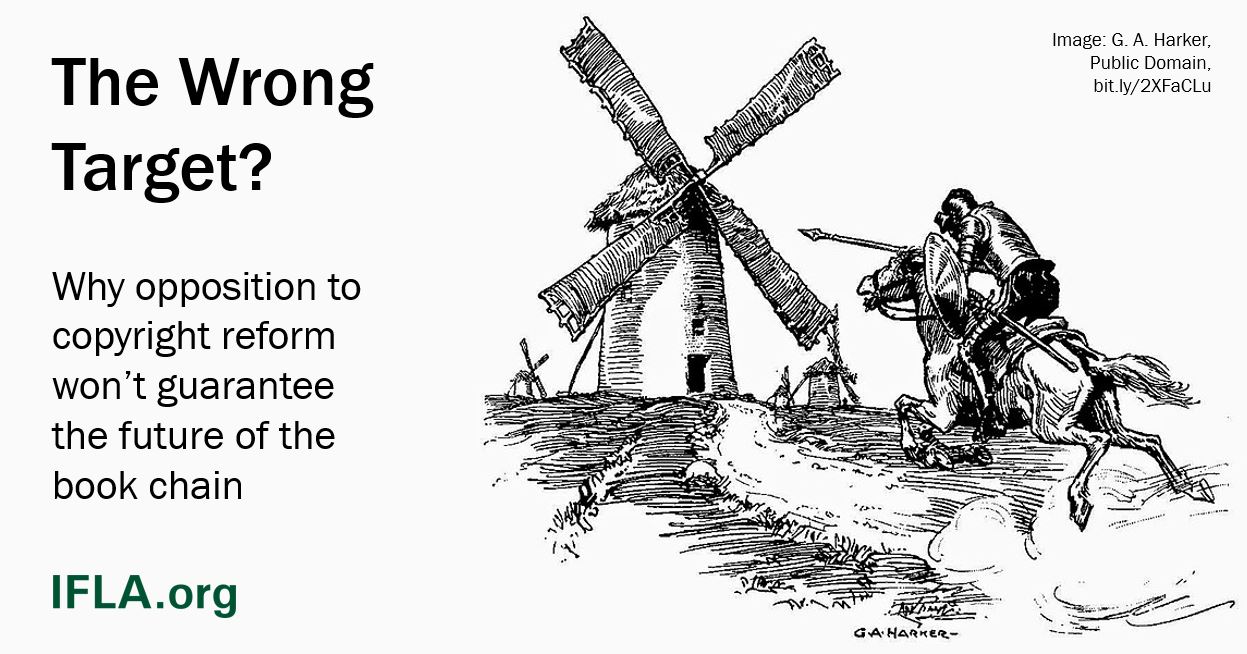
Copyright reforms introducing or updating exceptions and limitations to copyright can easily become a lightning rod.
Recent examples have regularly seen apocalyptic claims about the collapse of the book chain – understood as all those involved in writing, editing, publishing, distributing and reading books – and the demise of creativity in general.
In a sector marked by concern about falling author incomes (despite overall growth in the sector), fears for the future sustainability of the publishing industry, and worry about the role of major internet platforms, it is understandable that there is a desire to take action.
It is true that policy reforms seem to allow this, given the possibility to engage politicians, make statements and get involved in the media debate. Many have done this, claiming that by preventing libraries from enjoying new rights, it is possible to secure the future.
However, just because it is possible to take a position , it does not mean that it is sensible or correct to do so.
This blog explains how in the short term, modern copyright exceptions and limitations for libraries do not pose a threat to the future of the book chain. Instead, it argues, a healthy library sector, enabled by such exceptions and limitations, is a key guarantor of future success and viability.
A Complex Challenge Deserves Better Than a Simplistic Response
A number of questions are at play in determining the health of the book chain.
Effective cultural policies supporting new and diverse voices, competition policies to prevent individual actors (such as Internet platforms) taking too powerful a position, and regulation of contracts between authors and publishers are all important. Other regulations, such around book pricing or taxation, as well as copyright enforcement, can also play a role.
There are also factors beyond policy – a shift to digital and the ability (or inability) of the sector to keep up, growing competition for readers’ attention, and changing trends in education and research.
In effect, the challenges and questions facing the book chain are multiple, as are the tools for responding to them. A short-sighted focus only on stopping copyright reforms is highly limiting, and will do nothing to increase authors’ shares of revenue from their works, provide targeted support for new voices, or address the dominance of digital platforms.
This has not stopped some from trying to argue that modern copyright rules will mean disaster. However, each time there has been a truly comprehensive effort to look at the evidence recently, this argument has been rejected.
In Canada, for example, where the Parliament’s Industry, Science and Technology Committee held a thorough review of the country’s 2012 copyright reform. However, despite intense calls for one particular reform (the extension of educational fair dealing, confirming decisions already made by the courts) to be repealed, it rejected the claims made:
“Despite the volume and diversity of evidence submitted throughout the review, the Committee observed a problematic lack of authoritative and impartial data and analysis on major issues. Multiple witnesses either overestimated how strongly the data they presented supported their arguments or failed to disclose its limitations”.
Similarly in Australia, the Productivity Commission, charged with making an independent assessment of the impact of different policy actions, found very little evidence to back up claims that fair use would cause any unjustifiable harm to the publishing industry.
As Deputy Commissioner Karen Chester noted in a speech, the claims made against reforms which would benefit libraries and users simply have evidence behind them. Moreover:
“It was claimed that fair use destroys publishing industries and has done so in Canada, and particularly their educational resource sector. That claim did not stand up to even modest scrutiny: the experience in Canada has been grossly misrepresented and ignores specific market factors there”.
Similarly, impact assessments in the European Union and Singapore have also underlined that well-designed copyright exceptions are very much a positive sum game, with no harm to publishers or authors, and significant gains to researchers, educators and readers.
Sacrificing the Long-Term?
Of course in the long-run, it is not a case of there being two ‘sides’ to the debate – rightholders and readers. Today’s readers may well be tomorrow’s creators, innovators and researchers.
This is where libraries come in. Through promoting literacy and a love of reading, supporting responsive and innovative teaching, and helping students and researchers, they have a key role in ensuring a ‘pipeline’ of new talent.
Moreover, through giving access to heritage and existing ideas, they are spaces where new ideas can come to life.
They also have a key role in ensuring the legitimacy of the book chain, by ensuring that it does not simply become the preserve of the wealthier. The goal of the great library builders of the 19th Century to democratise knowledge is still relevant today.
Yet to continue to play this role, libraries need to benefit from a basic set of exceptions and limitations that work in the digital age. Preservation, lending and supporting education and research are core functions around which there should be little disagreement.
There is a growing body of evidence that underlines the costs to library users of rules that do not allow libraries to fulfil their missions. This contrasts – as set out above – with the lack of evidence that library exceptions and limitations actually do any short-term harm to the book sector.
In the light of this, it is perhaps time to look more broadly at the actions that can be taken to guarantee the future of the book chain. This may be hard – the questions are difficult ones, and the effort required will be higher. It also involves stepping away from old and comfortable assumptions.
Nonetheless, this would certainly be a more constructive approach than to spend time and energy opposing reforms that would in the short term be neutral, and in the long term be positive, for all involved.